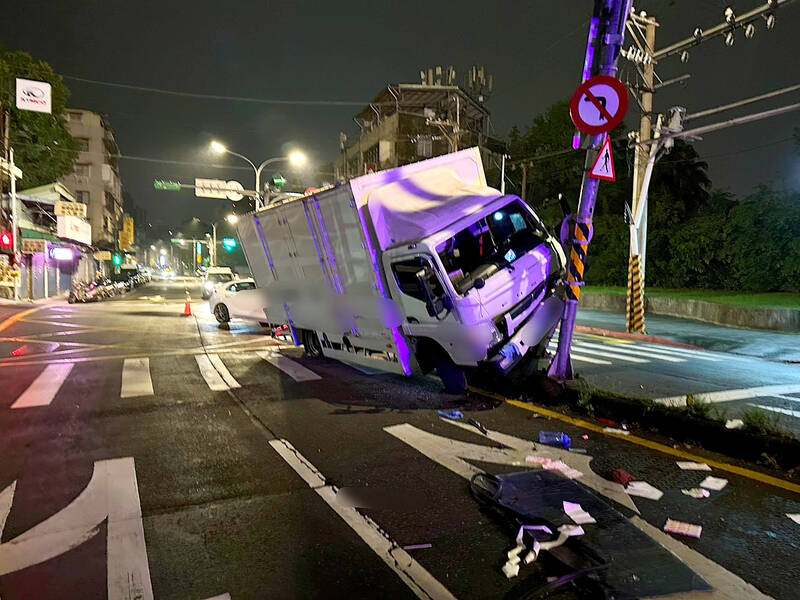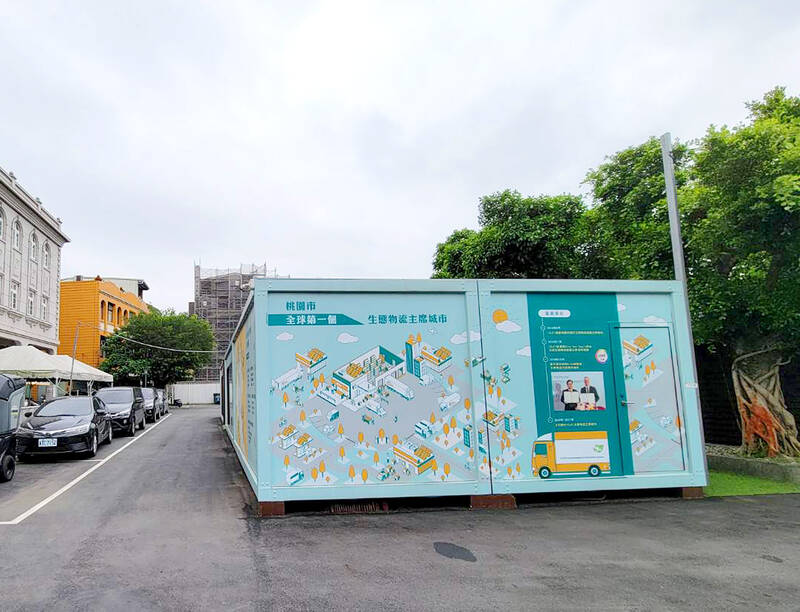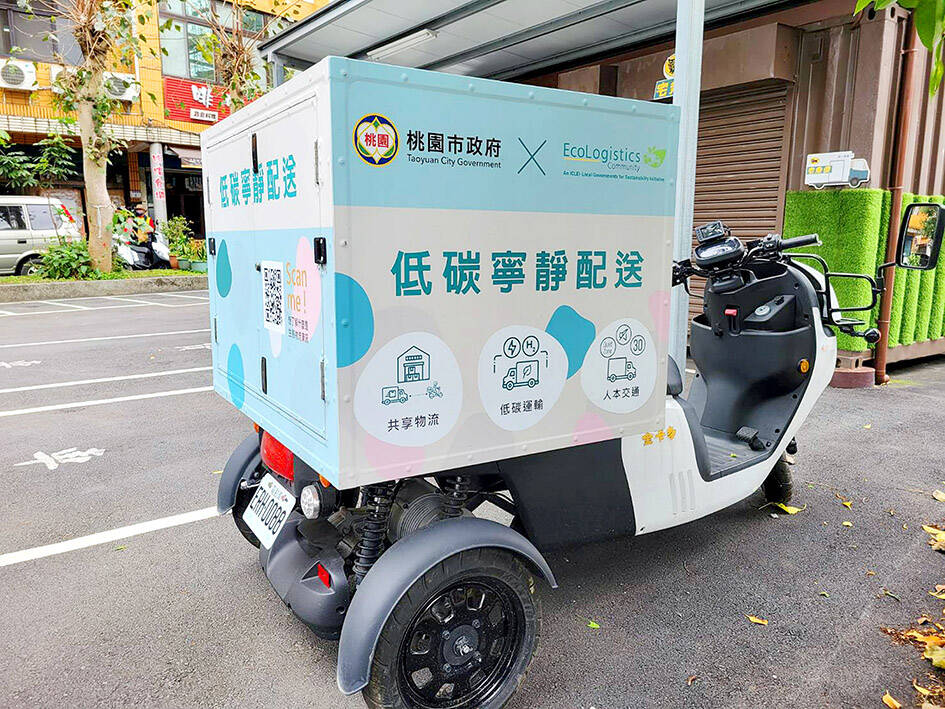Apart from the goods they carry, delivery trucks bring nothing positive to urban areas. The majority burn diesel or gasoline, and drivers often leave the engines running while making deliveries, exacerbating air pollution.
When these vehicles block the street, they delay other road users, causing frustration as well as yet more carbon dioxide to enter the atmosphere. By occupying sidewalks and creating blind spots, they increase the risk of accidents, especially for those on foot. If local governments do designate loading/unloading zones, typically they reduce the space available for pedestrians and cyclists. What’s more, trucks are noisy.
But it doesn’t have to be this way. An intriguing experiment in Taoyuan’s Dasi District (大溪) suggests that, when government entities cooperate with NGOs and private businesses, it’s possible to alleviate these negative externalities.

Photo: Lu Yun-fung, Taipei Times
Dasi’s Low Carbon and Quiet Consolidation Center (LCQCC) project recognized that, within conventional delivery ecosystems, there’s a vast amount of duplication. In busy neighborhoods, it’s not unusual to see a vehicle drop off a package at one address, then, a short time later, see another approach from the same direction and deliver something to the building next door. The center, the first of its kind in Taiwan, aimed to lessen the environmental footprint of the final stage of the manufacturer-to-consumer journey.
In a recent white paper published by the World Economic Forum (WEF), researchers noted that the rapid growth of e-commerce has led to a surge in the number of delivery vehicles on urban roads, and that “[under] a business-as-usual scenario, carbon emissions from all urban delivery traffic could increase by 60 percent by 2030…[the] urgent need to transition to zero-emission fleets and shared infrastructure is evident.”
In Taiwan, a delivery truck making a stop on its regular rounds may well save the deliveree a 10-km round trip. Because some people get around by car or motorcycle, while others use public transportation, it’s hard to say if e-commerce adds to or reduces the overall environmental cost of our shopping habits — even when ignoring associated issues like excessive packaging. But whether it does or it doesn’t, there’s no good reason why logistics companies shouldn’t be pushed to make their operations as sustainable as possible.

Photo: Lu Yun-fung, Taipei Times
THE LAND QUESTION
The LCQCC initiative was launched in December 2020 as one of five eco-logistics demonstration areas proposed by the Taoyuan City Government. A parking lot 400m south of Heping Road (和平路) and the town’s touristy old quarter was converted into a facility where goods from outside the area were transferred from conventional trucks to vehicles more appropriate to a crowded urban environment. In this case, electric three-wheelers were used for the “last mile.”
Urban Consolidation Centers (UCCs), as they’re known, are nothing new. According to a July 2012 paper in Transport Reviews, more than 100 were set up in 17 countries over the previous 40 years. Some have been a success, it seems: in Monaco, the amount of kerbside space occupied by delivery vehicles fell by 42 percent after a UCC was introduced.

Photo: Chen En-hui, Taipei Times
As the WEF paper points out, real estate shortages often make creating a UCC very difficult. In addition to having enough space so trucks can unload, such facilities need electric-vehicle charging points and storage for goods awaiting delivery or pickup.
Given the crowded character of Taiwan’s urban areas, it wasn’t surprising that land issues led to the termination of the LCQCC experiment. As reported in the April 9, 2023 issue of the Liberty Times, the Chinese-language sister newspaper of the Taipei Times, a lack of parking spots in the heart of Daxi caused a backlash against the consolidation center. A few months after that report, the LCQCC was dismantled and the site became a parking lot once again.
A recent academic paper examining the LCQCC, “Advancing Sustainable Last-Mile Delivery with Collaborative Governance: Lessons from Daxi’s Low Carbon and Quiet
Consolidation Center” (Urban Policy and Research, March 3) notes that Taiwan’s logistics industry has enjoyed rapid growth in recent years, but “the absence of a national or local logistics plan addressing the industry’s sustainability is a significant gap that needs to be filled.”
The paper, authored by a team at National Cheng Kung University’s (NCKU) Department of Transportation and Communication Management Science, points out that various aspects of the industry are overseen by the Ministry of Transportation and Communications, the Ministry of Economic Affairs and the Ministry of Finance. This “siloed approach,” it goes on to say, has resulted in an “unclear allocation of resources, budgeting and guidance, making it challenging to identify and address issues” and potential solutions.
The paper recounts how setting up the LCQCC required considerable grassroots engagement, including door-to-door visits, to develop partnerships and allay business owners’ concerns that the project would interrupt their operations. The city government appointed the Takoham Environmental Sustainability Foundation (財團法人大嵙崁環境永續發展基金會) as the local coordinator. This Dasi-based entity can be described as a “government-organized NGO” or GONGO, as the initial impetus and funding came from the local government.
INADEQUATE PARTICIPATION
Kerry TJ Logistics, President Transnet and HCT Logistics — three of Taiwan’s four major last-mile delivery operators — joined the project. State-owned Chunghwa Post was the biggest but not the only holdout.
Explaining that last-mile delivery is often handled by smaller companies, the paper’s lead author tells the Taipei Times that the project would have been more successful if it had included all delivery operators. This would have created “a level playing field,” says Cheng Tsu-jui (鄭祖睿), an NCKU assistant professor.
Using a GONGO to kick off the project was a good move, he adds, but “in the long run, the operation of a consolidation center should be transferred to a local business organization. From land-use perspectives, the center could have been a good opportunity to properly plan freight loading/unloading areas and low-emissions zones in Daxi, so as to double down on the benefits of the LCQCC.”
Cheng also noticed that the project suffered from a “discontinuation of political commitment” after Simon Chang (張善政) of the Chinese Nationalist Party (KMT) succeeded Cheng Wen-tsan (鄭文燦) of the Democratic Progressive Party (DPP) as Taoyuan’s mayor.
Elsewhere in Taiwan, NCKU’s Cheng thinks close-knit neighborhoods and business improvement districts might be suitable locations for consolidation centers.
Entrepreneurs who require deliveries or pickups multiple times each week are likely to support such initiatives, especially if they’re keen to improve the overall environment for their customers. Anping (安平) in Tainan, and neighborhoods where there’s potential for pedestrianization, might be good candidates, he says.
“But the challenge remains as to how last-mile delivery can be organized. Should shops pick up their own goods or should a local business association contract a logistics company to do it?” Cheng says.
Asked if any local governments have an especially forward-thinking approach to last-mile logistics, Cheng replies: “No, because of the fragmentation of freight transportation governance here. But Taiwan isn’t alone. Globally, few local governments have this capacity.”
However, he expresses some optimism, saying: “Now that the national government is planning low-emission zones, hopefully the issue of urban freight will soon be included in their discussions.”
Steven Crook, the author or co-author of four books about Taiwan, has been following environmental issues since he arrived in the country in 1991. He drives a hybrid and carries his own chopsticks. The views expressed here are his own.

Google unveiled an artificial intelligence tool Wednesday that its scientists said would help unravel the mysteries of the human genome — and could one day lead to new treatments for diseases. The deep learning model AlphaGenome was hailed by outside researchers as a “breakthrough” that would let scientists study and even simulate the roots of difficult-to-treat genetic diseases. While the first complete map of the human genome in 2003 “gave us the book of life, reading it remained a challenge,” Pushmeet Kohli, vice president of research at Google DeepMind, told journalists. “We have the text,” he said, which is a sequence of

On a harsh winter afternoon last month, 2,000 protesters marched and chanted slogans such as “CCP out” and “Korea for Koreans” in Seoul’s popular Gangnam District. Participants — mostly students — wore caps printed with the Chinese characters for “exterminate communism” (滅共) and held banners reading “Heaven will destroy the Chinese Communist Party” (天滅中共). During the march, Park Jun-young, the leader of the protest organizer “Free University,” a conservative youth movement, who was on a hunger strike, collapsed after delivering a speech in sub-zero temperatures and was later hospitalized. Several protesters shaved their heads at the end of the demonstration. A

Every now and then, even hardcore hikers like to sleep in, leave the heavy gear at home and just enjoy a relaxed half-day stroll in the mountains: no cold, no steep uphills, no pressure to walk a certain distance in a day. In the winter, the mild climate and lower elevations of the forests in Taiwan’s far south offer a number of easy escapes like this. A prime example is the river above Mudan Reservoir (牡丹水庫): with shallow water, gentle current, abundant wildlife and a complete lack of tourists, this walk is accessible to nearly everyone but still feels quite remote.

In August of 1949 American journalist Darrell Berrigan toured occupied Formosa and on Aug. 13 published “Should We Grab Formosa?” in the Saturday Evening Post. Berrigan, cataloguing the numerous horrors of corruption and looting the occupying Republic of China (ROC) was inflicting on the locals, advocated outright annexation of Taiwan by the US. He contended the islanders would welcome that. Berrigan also observed that the islanders were planning another revolt, and wrote of their “island nationalism.” The US position on Taiwan was well known there, and islanders, he said, had told him of US official statements that Taiwan had not